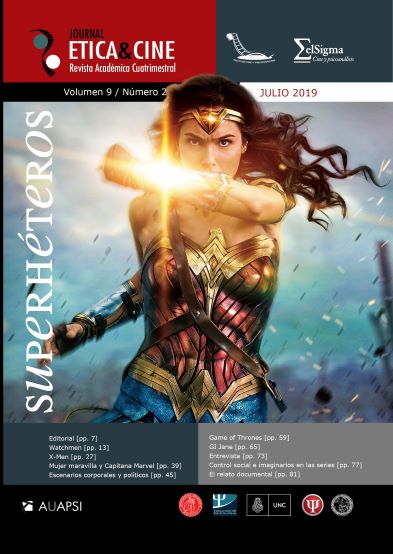Wonderwoman and Captain Marvel Diverging: approaches to feminist ethics
DOI:
https://doi.org/10.31056/2250.5415.v9.n2.25089Keywords:
Captain Marvel, Wonder Woman, Feminist ethics, Liberal feminism, Care ethicsAbstract
In this essay are adressed two exciting films where female superheroes are protagonists. This is a recent movie genre that is having a great reception among fans, this is as a novel way of telling action stories. The first film, produced by DC comics and Warner studios, Wonder Woman(Jenkins, 2007), the legendary Amazon, heiress of the Olympian gods and one of the leaders of the justice league, a prototype heroine charactheristic of feminine ethics of care. The other film is from Marvel Comics, Captain Marvel (Bodoen y Fleck, 2019), an incredible pilot, who by an act of chance got superpowers of alien origins and becomes the strongest avenger and a key element of the new super production of this publishing house, being a representative of the Ethical feminist liberals. Each of these superheroes has different origins and also has characteristics related to the current feminist ethics. The wonder woman bases her moral development on equity, the special characteristics of women and their devotion to care. On the other hand, Captain Marvel, a competitive leader who has a development in the pursuit of gender equality in the face of adversity and power conflicts. This essay wants to evidence the differences of these characters and their divergent moral associations, and how this determines a particular representation of the ideal woman who it seems to have each of the comic book publisher.References
Alday, D. (9 de 05 de 2019). Captain Marvel: origen e historia de Carol Danvers [Mensaje en un blog]. Recuperado de https://www.superaficionados.com/captain-marvel-origen-historia/
Claremont, C. (1987). Ms. Marvel #20. Ms Marvel. New York: Marvel
Conway, G. (1977). Ms. Marvel #1. Ms. Marvel. New York: Marvel
Feige, K. (productor) y Bodoen, A. y Fleck, R. (directores). (2019). Capitana Marvel [Cinta cinematográfica]. Estados Unidos: Marvel Studios.
Feige, K. (productor) y Gunn, J. (director). (2014). Guardianes de la Galaxia [Cinta cinematográfica]. Estados Unidos: Marvel Studios.
Feige, K. (productor) y Russo, A. y Russo, J. (directores). (2019). Avengers: Endgame [Cinta cinematográfica]. Estados Unidos: Marvel Studios.
Gilligan, C. (1982). In a Different Voice: Psychological Theory and Women’s Development. Cabridge, Massachusetts: harvard university press.
Gilligan, C. (2013). La ética del cuidado. Barcelona: Cuadernos de la Fundació Víctor Grífols.
Johns, G., Snyder, Z., Snyder, D., Berg, J. (productores) y Jenkins, P. (director). (2017). Wonder Woman [Cinta cinematográfica]. Estados Unidos: DC films.
Jiménez, P. (2006). DC Comics enciclopedia: la guía definitiva de los personajes del universo DC. Barcelona: Auto-editor.
León, A. (agosto de 2018). La historia de Carol Danvers/Capitana Marvel [Mensaje en un blog]. Recuperado de https://www.smashmexico.com.mx/marvelc/historia-carol-danvers-capitana-marvel/
Marston, W. M. (1941). All Star Comics. Estados Unidos: National Periodical Publications.
Ortiz, G. (2014). Ética feminista, ética femenina y aborto. Recuperado de: https://www.academia.edu/3735693/Etica_feminista_%C3%A9tica_femenina_y_aborto
Roven, C. y Snyder, D. (productores) y Snyder, Z. (director). (2016). Batman vs Superman: el amanecer de la justicia [Cinta cinematográfica]. Estados Unidos: DC Entertainment; Atlas Entertainment; RatPac-Dune Entertainment; Cruel and Unusual Films.
Schuler Donner, L., Kingberg, S., Singer, B. (productores) y Kinberg, S. (director). (2019). Dark Phoenix [Cinta cinematográfica]. Estados Unidos: The Donners’ Company; Kingberg Genre; TSG Entertainment; Marvel Entertainment; 20th Century Fox.
Stanford. (2008). Stanford Encyclopedia of Philosophy. Recuperado de: https://stanford.library.sydney.edu.au/archives/sum2008/entries/feminism-ethics/#FemistAppEth
Thomas, R. (1968). Marvel Super-Heroes # 13. Marvel Super-Heroes. New York: Marvel
Downloads
Published
Issue
Section
License
Los autores que publiquen en Ética y Cine Journal aceptan las siguientes condiciones:
Los autores/as conservan los derechos de autor © y permiten la publicación a Ética y Cine Journal, bajo licencia CC BY-SA / Reconocimiento - Reconocimiento-CompartirIgual 4.0 Internacional. La adopción de esta licencia permite copiar, redistribuir, comunicar públicamente la obra, reconociendo los créditos de la misma, y construir sobre el material publicado, debiendo otorgar el crédito apropiado a través de un enlace a la licencia e indicando si se realizaron cambios.

Este obra está bajo una licencia de Creative Commons Reconocimiento-CompartirIgual 4.0 Internacional.




